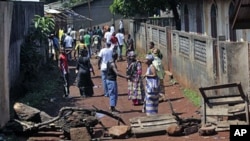A top official of the Economic Community of West African States (ECOWAS) said the West African regional bloc will continue to work with political leaders in Guinea to ensure peace and stability ahead of a Supreme Court ruling to certify the results of last week’s presidential run-off vote.
Sonny Ugoh, communications director for ECOWAS said supporters of President-elect Alpha Conde and challenger Cellou Dalein Diallo should desist from engaging in violence that could destabilize the country.
“It’s important for all the parties in Guinea, particularly the two parties that went for the run-off to keep their supporters under check. They have the greater responsibility to maintain peace and security in that country. It is only under that kind of atmosphere, of course, that you can talk about democracy, which is what we have been anxious to return to that country.”
This came after Guinea's military government declared a state of emergency, as violence sparked by the disputed presidential election continued.
Army Chief Nouhou Thiam said in a nationwide television broadcast Wednesday that the state of emergency will remain in effect until Guinea's Supreme Court verifies the election results.
ECOWAS official Ugoh said the regional bloc is working closely with the political leadership to ensure a stable Guinea in that country’s journey towards constitutional rule.
“By imposing the curfew, we believe that the military junta there is trying to make sure that whatever it is of the outcome of the election, the reaction the two parties particularly the party that was not declared the winner will put a lid on things so that it doesn’t get out of hands,” said Ugoh.
“We are watching the situation very keenly. We have an office there through which we are engaging with the various stakeholders, the leaders of the political parties and the junta to make sure that things don’t get out of hand.”
Army Chief Thiam said “troublemakers” were deliberately attacking security forces and civilians.
Officials say the decree prohibits any public gatherings and gives police extra powers to tackle the situation.
Guinea’s electoral law gives the Supreme Court until 23rd November to confirm the results.
Mr. Diallo is asking the Supreme Court to annul votes from two districts where he said thousands of members of his ethnic group were driven from their homes in pre-election violence. If those results are thrown out, Mr. Diallo would end up with more votes than Mr. Conde.
The presidential election was considered Guinea's first democratic vote after more than 50 years of dictatorship and military control.




